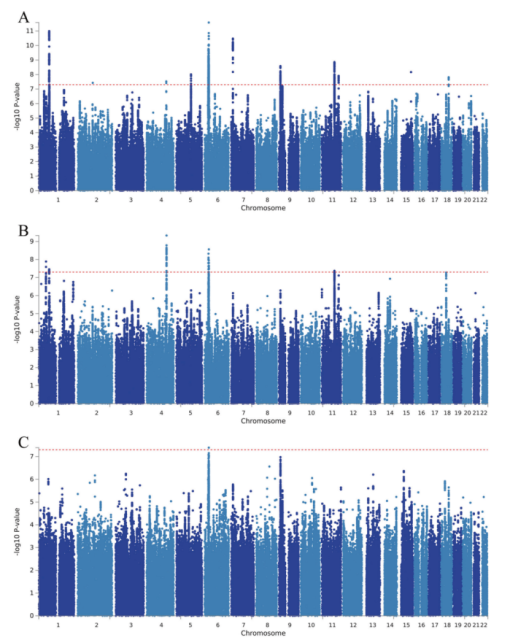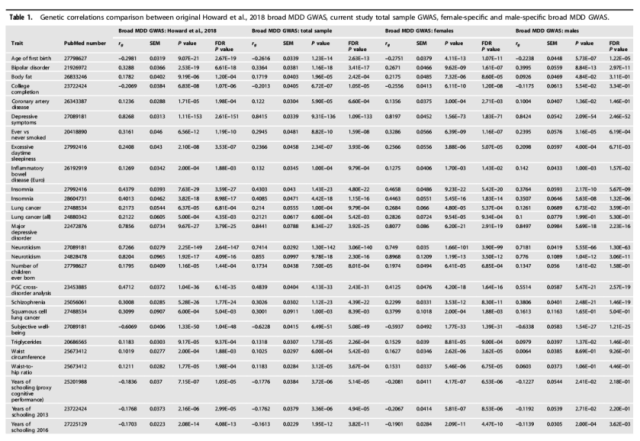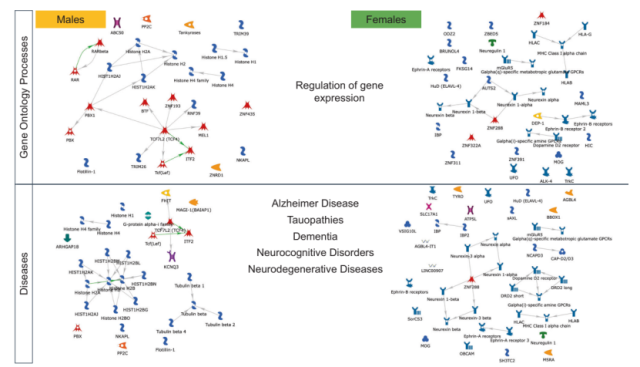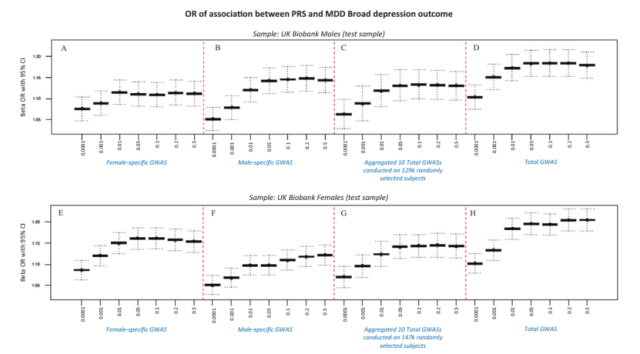Why are women more likely to be depressed?
- Why Lecanemab’s Adoption Faces an Uphill Battle in US?
- Yogurt and High LDL Cholesterol: Can You Still Enjoy It?
- WHO Releases Global Influenza Vaccine Market Study in 2024
- HIV Infections Linked to Unlicensed Spa’s Vampire Facial Treatments
- A Single US$2.15-Million Injection to Block 90% of Cancer Cell Formation
- WIV: Prevention of New Disease X and Investigation of the Origin of COVID-19
Why are women more likely to be depressed?
- Red Yeast Rice Scare Grips Japan: Over 114 Hospitalized and 5 Deaths
- Long COVID Brain Fog: Blood-Brain Barrier Damage and Persistent Inflammation
- FDA has mandated a top-level black box warning for all marketed CAR-T therapies
- Can people with high blood pressure eat peanuts?
- What is the difference between dopamine and dobutamine?
- How long can the patient live after heart stent surgery?
Molecular Psychiatry: Why are women more likely to be depressed? Sex-specific genetic pathways for depression revealed in first genome-wide association study.
Compared with men, women have a higher risk of suffering from depression, and their condition is more serious and complex [1, 2]. In addition to social factors behind this, how much does genetic difference play a role in it?
Recently, the team of Michael J. Meaney from McGill University published an important study in “Molecular Psychiatry” [3], which for the first time identified a sex-specific molecular pathway related to depression through genome-wide association studies (GWAS), revealing that depression Sex-specific genetic pathways of the disease.
By conducting a sex-specific depression GWAS analysis of UK Biobank data, the researchers found that 11 loci in women and only 1 locus in men were significantly associated with a depressive phenotype .
At the same time, gender differences also affect the genetic correlation of depression phenotypes with other clinical phenotypes. For example, the genetic correlations of some metabolic characteristics (such as body fat, wais
t circumference, waist-to-hip ratio, and triglycerides) with depression phenotypes are only found in females. reached a significant level .
In addition, the findings also suggest that the biological processes involved in the genetics of depression and the targeting of antidepressants differ in men and women, implying that treatment approaches may also need to be differentiated by sex . These findings further the researchers’ understanding of sex-associated genetic pathways for depression.
 Screenshot of paper homepage
Screenshot of paper homepage
Participants in this study were all from the UK Biobank, and participants with obvious kinship were excluded.
Participants were identified as either generalized depressed or a control population based on self-reported responses to the question “Have they ever seen a doctor for nervousness, anxiety, tension, or depression?” [4]. A total of 274,141 participants were included in the final study, including 127,867 men and 146,274 women.
In the GWAS analysis of generalized depression in the general population, a total of 18 loci and 2819 gene variations were significantly associated with generalized depression .
These results are consistent with the previously reported results of GWAS analysis of generalized depression in mixed populations [4].
Next, the researchers stratified the total sample by sex and performed GWAS analysis separately. The results showed that in the female-specific GWAS analysis, a total of 11 loci were found to be significantly associated with generalized depression, while only 1 locus reached the significance level in men .
 GWAS analysis of total population, female-specific and male-specific generalized depression
GWAS analysis of total population, female-specific and male-specific generalized depression
Next, the researchers explored the genetic correlation between the depression phenotype and other clinical phenotypes, where genetic differences caused by sex differences were also found. In women, a total of 27 clinical phenotypes were significantly associated with genetic features of the depressive phenotype, compared with 15 in men .
Clinical phenotypes that showed significant associations with genetic traits of the depression phenotype only in women were mainly associated with metabolic traits such as body fat, waist circumference, waist-to-hip ratio, and triglycerides.
 Genetic correlations between depressive phenotypes and clinical phenotypes
Genetic correlations between depressive phenotypes and clinical phenotypes
Next, the researchers compared single nucleotide polymorphisms (SNPs) in the GWAS analysis.
There were 147, 64 and 53 genes that were significantly associated with generalized depression in the total population, female-specific, and male-specific generalized depression GWAS analysis, respectively.
Genes that were significantly expressed only in females included GRM5 and ELAVL4 (both of which were previously reported to be associated with depression [4, 5]) .
There is a certain overlap between male and female specific generalized depression GWAS-related gene enrichment pathways, the most important of which is glutathione metabolism-related pathways.
Glutathione participates in antioxidant defense and is closely related to gene expression regulation, cell proliferation, apoptosis, signal transduction and immune response[6].
In addition, other cross-cutting pathways include negative regulation of viral life cycle, regulation of virus release from host cells, regulation of DNA template transcription, regulation of nucleic acid template transcription, regulation of RNA biosynthesis process, and pathways related to neurocognitive and neurodegenerative diseases.
Notably, ‘regulation of gene expression’ was the most frequently occurring Gene Ontology (GO) process in the enrichment of genes associated with male- and female-specific generalized depression GWAS.
In males, however, ‘regulation of gene expression’ maps to include the TCF4 gene , a known regulator of epigenetic states such as the regulation of DNA methylation [7], as well as a large number of genes encoding histone variants. In females, “regulation of gene expression” mapped to genes associated with many neurotoxins, DRD2 and GRM5 .
Multiple psychopathology and neurodegenerative disease entries were associated with male- and female-specific generalized depression GWAS genes, where genes involved in the regulation of epigenetic processes and neurotransmitter release were obtained from GWAS analyzes in males, whereas DRD2 signaling and a large number of Genes related to adaptive immunity were derived from female GWAS analysis .
From the above results, it can be seen that the effects of generalized depression-related genes on the brain in both men and women are caused by unique sex-specific mechanisms .
 Enrichment analysis of genes related to male and female specific generalized depression GWAS
Enrichment analysis of genes related to male and female specific generalized depression GWAS
In addition, the researchers analyzed the transcription factors significantly associated with generalized depression in the GWAS analysis.
Enrichment analysis of these transcription factors showed enrichment of transcription factors related to immune response and NF-κB signaling in both males and females, including FOXP3, RBPJ kappa, RUNX1, and TAL1.
Transcription factors identified in male-specific generalized depression GWAS are associated with tissue and neuronal differentiation and epigenetic processes (e.g., E2F1, Esrrb, NRSF, ZFX, ZNF423) , emphasizing the role of chromatin remodeling factors in male onset potential role .
The transcription factors identified in female-specific generalized depression GWAS are associated with oxidative stress, apoptosis, and type 2 diabetes (such as HNF3-beta, MafA, p63, RelA, VDR) , which are related to the depressive phenotype and Genetic correlates of metabolic disease-associated phenotypes were consistent .
At the same time, the researchers also found that the main biological processes associated with generalized depression and that can be targeted by antidepressants are mainly epigenetic processes in men, such as chromatin assembly, cell cycle regulation, and inflammation (mainly through IL-7). ), and in women, neuronal migration, neurotrophic factors, modulation of synaptic plasticity, and dopamine neurotransmission.
These findings suggest that the biological processes involved in the genetics of depression and the targeting of antidepressants differ in men and women, implying that treatment approaches may likewise need to be differentiated by gender .
Finally, we calculated a polygenic risk score (PRS) to predict population-based depression phenotypes through pooled, male- and female-specific GWAS.
As expected, male-specific PRS showed better performance than mixed and female-specific PRS in predicting male depressive phenotype outcome.
Similarly, female-specific PRS had better predictive value for female depressive phenotype than mixed and male-specific PRS.
 Comparison of PRS predictive depression phenotypes using pooled, female-specific and male-specific GWAS
Comparison of PRS predictive depression phenotypes using pooled, female-specific and male-specific GWAS
Overall, this study demonstrates that there are sex-specific differences in the genetic background associated with human depression, and reveals common and unique biological mechanisms in males and females through sex-specific generalized depression GWAS analysis, which is helpful for the development of Sex-specific treatment options.
references
1. Marcus SM, Young EA, Kerber KB, Kornstein S, Farabaugh AH, Mitchell J, Wisniewski SR, Balasubramani GK, Trivedi MH, Rush AJ: Gender differences in depression: findings from the STAR*D study. J Affect Disord 2005, 87(2-3):141-150.
2. Mackenzie CS, Reynolds K, Cairney J, Streiner DL, Sareen J: Disorder-specific mental health service use for mood and anxiety disorders: associations with age, sex, and psychiatric comorbidity. Depress Anxiety 2012, 29(3):234 -242.
3. Silveira PP, Pokhvisneva I, Howard DM, Meaney MJ: A sex-specific genome-wide association study of depression phenotypes in UK Biobank. Mol Psychiatry 2023.
4. Howard DM, Adams MJ, Shirali M, Clarke TK, Marioni RE, Davies G, Coleman JRI, Alloza C, Shen X, Barbu MC et al: Genome-wide association study of depression phenotypes in UK Biobank identifies variants in excitatory synaptic pathways. Nat Commun 2018, 9(1):1470.
5. Policicchio S, Washer S, Viana J, Iatrou A, Burrage J, Hannon E, Turecki G, Kaminsky Z, Mill J, Dempster EL et al: Genome-wide DNA methylation meta-analysis in the brains of suicide completers. Transl Psychiatry 2020, 10(1):69.
6. Wu G, Fang YZ, Yang S, Lupton JR, Turner ND: Glutathione metabolism and its implications for health. J Nutr 2004, 134(3):489-492.
7. Kennedy AJ, Rahn EJ, Paulukaitis BS, Savell KE, Kordasiewicz HB, Wang J, Lewis JW, Posey J, Strange SK, Guzman-Karlsson MC et al: Tcf4 Regulates Synaptic Plasticity, DNA Methylation, and Memory Function. Cell Rep 2016, 16(10):2666-2685.
Why are women more likely to be depressed?
(source:internet, reference only)
Disclaimer of medicaltrend.org
Important Note: The information provided is for informational purposes only and should not be considered as medical advice.



